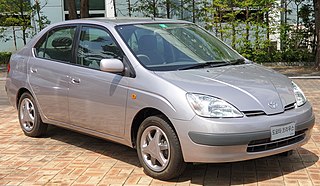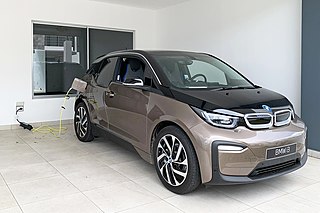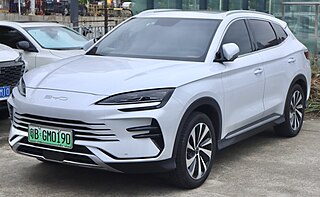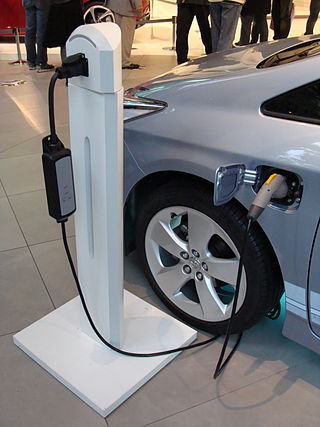
A hybrid vehicle is one that uses two or more distinct types of power, such as submarines that use diesel when surfaced and batteries when submerged. Other means to store energy include pressurized fluid in hydraulic hybrids.

An electric vehicle (EV) is a vehicle that uses one or more electric motors for propulsion. The vehicle can be powered by a collector system, with electricity from extravehicular sources, or can be powered autonomously by a battery or by converting fuel to electricity using a generator or fuel cells. EVs include road and rail vehicles, electric boats and underwater vessels, electric aircraft and electric spacecraft.

A zero-emission vehicle (ZEV) is a vehicle that does not emit exhaust gas or other pollutants from the onboard source of power. The California definition also adds that this includes under any and all possible operational modes and conditions. This is because under cold-start conditions for example, internal combustion engines tend to produce the maximum amount of pollutants. In a number of countries and states, transport is cited as the main source of greenhouse gases (GHG) and other pollutants. The desire to reduce this is thus politically strong.

A plug-in hybrid electric vehicle (PHEV) or simply plug-in hybrid is a type of hybrid electric vehicle equipped with a rechargeable battery pack that can be directly replenished via a charging cable plugged into an external electric power source, in addition to charging internally by its on-board internal combustion engine-powered generator. While PHEVs are predominantly passenger cars, there are also plug-in hybrid variants of sports cars, commercial vehicles, vans, utility trucks, buses, trains, motorcycles, mopeds, military vehicles and boats.

In automobile engineering, electric vehicle conversion is the replacement of a car's combustion engine and connected components with an electric motor and batteries, to create a battery electric vehicle (BEV).

An electric truck is a battery electric vehicle (BEV) designed to transport cargo, carry specialized payloads, or perform other utilitarian work.

An electric vehicle battery is a rechargeable battery used to power the electric motors of a battery electric vehicle (BEV) or hybrid electric vehicle (HEV).

An electric car or electric vehicle (EV) is a passenger automobile that is propelled by an electric traction motor, using electrical energy as the primary source of propulsion. The term normally refers to a plug-in electric vehicle, typically a battery electric vehicle (BEV), which only uses energy stored in on-board battery packs, but broadly may also include plug-in hybrid electric vehicle (PHEV), range-extended electric vehicle (REEV) and fuel cell electric vehicle (FCEV), which can convert electric power from other fuels via a generator or a fuel cell.

A battery electric vehicle (BEV), pure electric vehicle, only-electric vehicle, fully electric vehicle or all-electric vehicle is a type of electric vehicle (EV) that exclusively uses chemical energy stored in rechargeable battery packs, with no secondary source of propulsion. BEVs use electric motors and motor controllers instead of internal combustion engines (ICEs) for propulsion. They derive all power from battery packs and thus have no internal combustion engine, fuel cell, or fuel tank. BEVs include – but are not limited to – motorcycles, bicycles, scooters, skateboards, railcars, watercraft, forklifts, buses, trucks, and cars.

A plug-in electric vehicle (PEV) is any road vehicle that can utilize an external source of electricity to store electrical energy within its onboard rechargeable battery packs, to power an electric motor and help propelling the wheels. PEV is a subset of electric vehicles, and includes all-electric/battery electric vehicles (BEVs) and plug-in hybrid electric vehicles (PHEVs). Sales of the first series production plug-in electric vehicles began in December 2008 with the introduction of the plug-in hybrid BYD F3DM, and then with the all-electric Mitsubishi i-MiEV in July 2009, but global retail sales only gained traction after the introduction of the mass production all-electric Nissan Leaf and the plug-in hybrid Chevrolet Volt in December 2010.

Applegreen Limited is an Irish company founded in 1992 that operates 620 petrol stations in Ireland, the United Kingdom and the United States. It is a major petrol retailer in Ireland, and operates convenience stores and motorway service areas. Applegreen's headquarters are based in Park West Business Park in Dublin, Ireland.

The adoption of plug-in electric vehicles in the United States is supported by the American federal government, and several states and local governments.

Electric car use by country varies worldwide, as the adoption of plug-in electric vehicles is affected by consumer demand, market prices, availability of charging infrastructure, and government policies, such as purchase incentives and long term regulatory signals.

Government incentives for plug-in electric vehicles have been established around the world to support policy-driven adoption of plug-in electric vehicles. These incentives mainly take the form of purchase rebates, tax exemptions and tax credits, and additional perks that range from access to bus lanes to waivers on fees. The amount of the financial incentives may depend on vehicle battery size or all-electric range. Often hybrid electric vehicles are included. Some countries extend the benefits to fuel cell vehicles, and electric vehicle conversions.

The fleet of light-duty plug-in electric vehicles in Japan totaled just over 300,000 highway legal plug-in electric vehicles in circulation at the end of 2020, consisting of 156,381 all-electric passenger cars, 136,700 plug-in hybrids, and 9,904 light-commercial vehicles.
The electric vehicle industry in India is slowly growing. The central and state governments have implemented schemes and incentives to promote electric mobility, and have introduced regulations and standards.

The adoption of electric vehicles in Hong Kong is actively supported by the Hong Kong government, which recognizes battery electric vehicles, plug-in hybrids, and conventional hybrid electric vehicles to be environmentally friendly and eligible for financial incentives. As of 31 October 2017, there were 11,039 electric vehicles in Hong Kong, up from less than 100 in 2010. At present, 73 EV models from eight countries have been approved by the Transport Department to be eligible for the incentives. These include 51 models for private cars and motorcycles and 22 models for public transport and commercial vehicles.

The adoption of plug-in electric vehicles in Australia is driven mostly by state-based electric vehicle targets and monetary incentives to support the adoption and deployment of low- or zero-emission vehicles. The monetary incentives include electric vehicle subsidies, interest-free loans, registration exemptions, stamp duty exemptions, the luxury car tax exemption and discounted parking for both private and commercial purchases. The Clean Energy Finance Corporation, energy providers, car loan providers and car insurance providers also offer their own financial incentives for electric vehicle purchases including Macquarie Bank offering the lowest electric car loan of 2.99%.
Electric vehicle policies in Australia include incentives such as electric vehicle subsidies, interest-free loans, registration exemptions, stamp duty exemptions, the luxury car tax exemption and discounted parking for both private and commercial purchases. The adoption of plug-in electric vehicles in Australia is driven mostly by state-based electric vehicle targets and monetary incentives to support the adoption and deployment of low- or zero-emission vehicles.

The adoption of plug-in electric vehicles in Iceland is the second highest in the world after Norway, and fully supported by the government. As of 2022, the market share of electric vehicles in Iceland is around 60%, the second-highest in the world behind Norway. Around 14% of the country's passenger car fleet is electrified as of 2022.


















